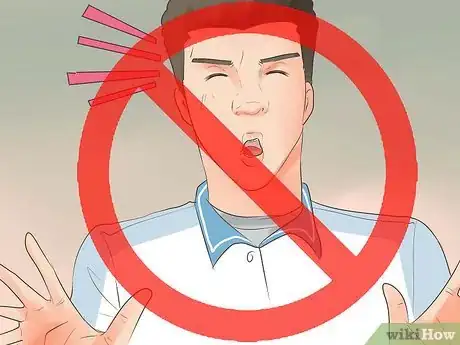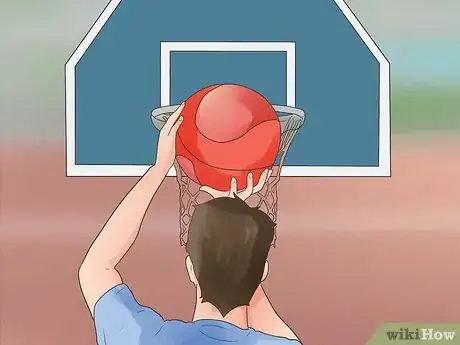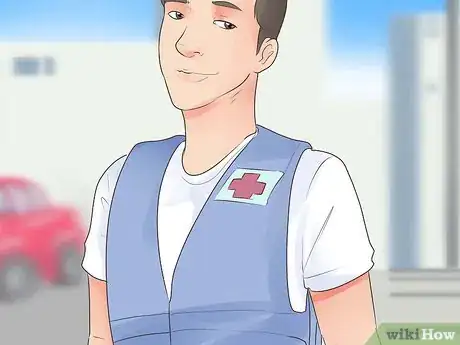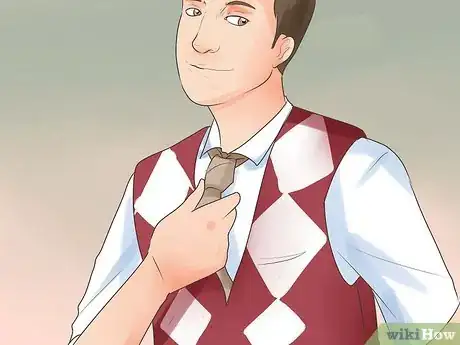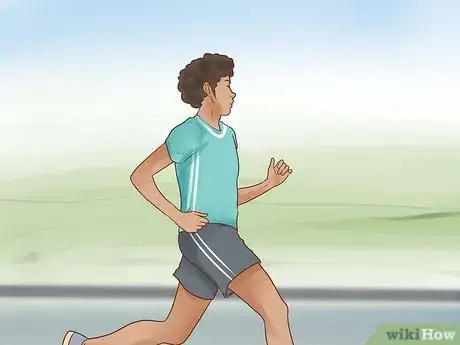This article was co-authored by Ashley Pritchard, MA. Ashley Pritchard is an Academic and School Counselor at Delaware Valley Regional High School in Frenchtown, New Jersey. Ashley has over 3 years of high school, college, and career counseling experience. She has an MA in School Counseling with a specialization in Mental Health from Caldwell University and is certified as an Independent Education Consultant through the University of California, Irvine.
This article has been viewed 59,065 times.
Talking to new people in school is somewhat difficult, particularly if everybody has their own cliques. It's also especially hard if you are a shy person or at a new school. When you are in highschool, it is important to try to make friends and have new experiences. This article addresses how to become more social in highschool.
Steps
Overcoming Shyness
-
1Accept that you aren't perfect. Everyone makes social and verbal faux pas. [1]
- Don't worry so much about saying the wrong thing.
- Stop expecting perfection from yourself in all situations.
- Allow yourself to be spontaneous.
-
2Stop saying no. Turning down invitations to social events can eventually hamper your social life. [2]
- If you are invited to join in an activity, say yes.
- Don't be afraid to try new things. You won't get anywhere by avoiding new experiences and people out of anxiety.
- Social experiences are also learning experiences. The more social experience you have, the easier it will be to interact with others.
Advertisement -
3Make eye contact. If you are avoiding others gaze, you are not likely to be noticed and acknowledged. [3]
- Look at people directly with a friendly expression. That will be more inviting for them to make conversation with you.
- Eye contact makes other people feel comfortable when interacting with you.
- Looking directly at other peoples faces will help you gauge their feelings and emotions, as well as build your own confidence in conversation.
Getting Involved in Activities
-
1Know your interests and strengths. There are often clubs or groups at most schools for almost all activities and interests.
- Are you interested in art? Music?
- Can you play any sports?
- Are you interested in theater or dance?
- Are you good at math or science?
-
2Talk to your guidance counselor. They are there to help you get more involved in school activities.[4]
- Your counselor will have a list of school clubs and activities.
- They can help you coordinate your interests and talents with activities on offer.
- Your counselor can help you contact the coach or faculty sponsor for sports or clubs.
- They can also give you advice on how to be more confident socially.
-
3Join a special interest club. When you do this you find people who share your interests. [5]
- Spend less time on solitary interests and join a club to do activities socially.
- Don't worry about seeming like a nerd. In your club or group, you will find other people with similar interests and tastes.
- Working on group projects with a special interest group can help you showcase your talents and make friends.
- Ask people in your club to socialize outside of school, such as going out for coffee or a movie.
-
4Play a sport. Sports teams are often close knit and supportive social groups.
- Joining a sports team can help you meet other kids who like the same activities.
- Often times, sports teams will organize social activities for the players.
- Playing a sport will help you build confidence.
- You will learn a lot of social skills if you are part of a sports team. You will need to work as a team to win a game or championship.
- Kids who play sports often build strong lasting friendships.
-
5Join a volunteer activity. Many schools or churches hold charity drives or other volunteer opportunities.[6]
- Through volunteer programs you can meet lots of interesting people.
- Volunteering for a specific cause, such as the Red Cross or Habitat for Humanity, can help you find other kids with similar interests and goals.
- Helping others will help you increase your self-esteem.
- Broadening your horizons allows you to have interesting experiences that can be shared with others.
-
6Use social media. Websites like Facebook, Twitter, and Pinterest can help you get more involved in activities in your community.
- Facebook has many groups and events pages. Look for activities that interest you and are in your local community.
- This can help you find youth groups, camps, and social events outside of school.
- You can also find classes and other educational activities on offer in your city or town.
- You might find that people you already know have similar interests on social media. This can help you break the ice when talking to them.
Keeping Up Your Appearance
-
1Boost your confidence. Taking pride in one's appearance or making a small change can be a self-esteem booster.
- You don't have to change your appearance to make friends.
- Making small changes can help you be more confident if you like the way you look and feel.
- You can choose new looks and clothes that fit your own unique personality. You don't have to copy what everyone else wears!
-
2Practice basic grooming. Hygiene is always important. [7]
- Other kids will want to be social with someone who appears clean and neatly dressed.
- Wear deodorant daily.
- Make sure you brush and floss your teeth regularly.
- Shower or bathe daily and keep your hair clean.
- Guys should groom their facial hair. If you have a beard, make sure it isn't patchy or unkempt.
- Make sure to pluck eyebrows and rid your face of any distracting hair.
- Make sure your nails always look clean and trimmed.
-
3Take care of your skin. The teenage years can be tough with those with acne. [8]
- Wash your face daily with a mild facial cleanser.
- Avoid popping any acne you already have. This can make it worse and cause scarring.
- Try a topical acne treatment that's over the counter.
- See a doctor or dermatologist if your acne is worsening or severe.
-
4Dress for success. Make sure you wear clean clothes daily and look presentable. [9]
- Make sure you wear nothing with stains.
- Make sure your clothes are laundered and wrinkle free.
- Don't wear the same thing twice in a row.
- Make sure your clothes fit you properly. Don't wear anything overly baggy or too tight.
- Avoid wearing light colored socks with dark shoes and vice versa and avoid wearing socks with sandals.
-
5Give yourself a makeover. It doesn't have to be big; just little things can be altered. Changing your look does not mean changing your personality. [10]
- Change your hairstyle. Choose a haircut that best suits your face and personal preference.
- Consider changing from glasses to contacts. If you have to wear glasses, choose a frame that suits your face and is in style.
- If your teeth are dull or crooked, look into whitening or straightening. This isn't possible or affordable for everybody, but its an option that can help you change your overall appearance.
-
6Get into shape. You can exercise to maintain your physique or to be more healthy.[11]
- Get off the couch and grab you fitness clothes and go for a walk or run.
- Exercising will give you a more healthy appearance.
- Getting more physical activity can help you build confidence.
- You don't have to lose weight to get people to like you! However, physical activity can be a social activity too and opportunity to make new friends.
Expert Q&A
-
QuestionHow can I welcome a new kid at school?
 Ashley Pritchard, MAAshley Pritchard is an Academic and School Counselor at Delaware Valley Regional High School in Frenchtown, New Jersey. Ashley has over 3 years of high school, college, and career counseling experience. She has an MA in School Counseling with a specialization in Mental Health from Caldwell University and is certified as an Independent Education Consultant through the University of California, Irvine.
Ashley Pritchard, MAAshley Pritchard is an Academic and School Counselor at Delaware Valley Regional High School in Frenchtown, New Jersey. Ashley has over 3 years of high school, college, and career counseling experience. She has an MA in School Counseling with a specialization in Mental Health from Caldwell University and is certified as an Independent Education Consultant through the University of California, Irvine.
School Counselor Something as simple as saying hi to them in the hallway can go a long way! Also, offer them a place to sit during lunch, as lunch period can be a really overwhelming time for a new student.
Something as simple as saying hi to them in the hallway can go a long way! Also, offer them a place to sit during lunch, as lunch period can be a really overwhelming time for a new student.
References
- ↑ http://www.cnn.com/2014/06/03/living/how-to-overcome-shyness-relate-real-simple/
- ↑ http://www.cnn.com/2014/06/03/living/how-to-overcome-shyness-relate-real-simple/
- ↑ http://www.cnn.com/2014/06/03/living/how-to-overcome-shyness-relate-real-simple/
- ↑ Ashley Pritchard, MA. School Counselor. Expert Interview. 4 November 2019.
- ↑ http://www.superkids.com/aweb/pages/features/collegeviews/
- ↑ https://bigfuture.collegeboard.org/get-started/outside-the-classroom/volunteering-how-helping-others-helps-you
- ↑ http://www.succeedsocially.com/lookbetter
- ↑ http://www.succeedsocially.com/lookbetter
- ↑ http://www.succeedsocially.com/lookbetter

